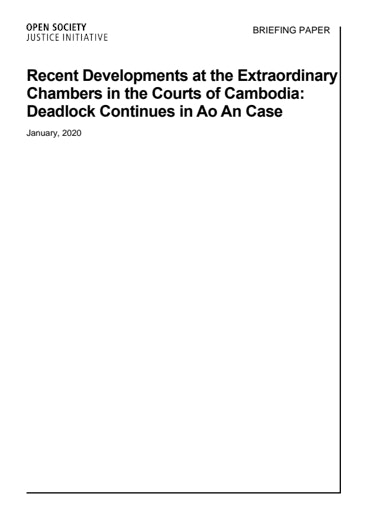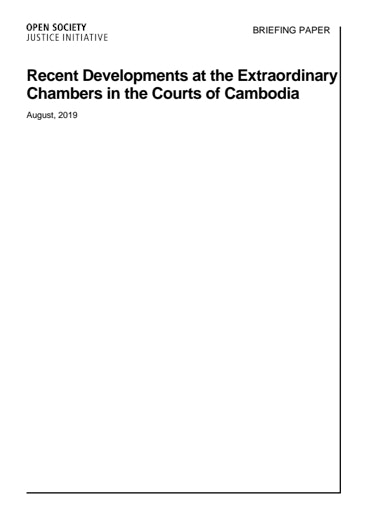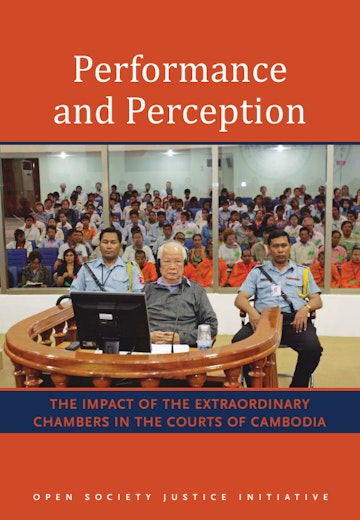Dead End at Cambodia's Khmer Rouge Tribunal: UN Must Respond
NEW YORK—The Open Society Justice Initiative is calling on the United Nations to cease support for three pending cases at Cambodia’s Khmer Rouge tribunal in response to political interference that has made it impossible to complete the cases consistent with applicable law.
The Extraordinary Chambers in the Courts of Cambodia (ECCC) tribunal was established in 2006 under an agreement between the U.N. and Cambodia to try the senior leaders deemed most responsible for mass atrocity crimes committed by the Khmer Rouge, which ruled the country from April, 1975, until the Vietnamese invasion of December, 1979.
However, the Government of Cambodia, as well as Cambodian prosecutors and judges, have consistently blocked efforts to pursue prosecutions of regional Khmer Rouge leaders implicated in grave abuses—despite detailed indictments issued by the international investigating judge for three such persons to be brought to trial. The national Trial Chamber Judges have stated they will not participate in a trial in the most advanced of the cases “now or in the future.”
These three cases, initiated 11 years ago, are currently deadlocked as a result of opposing rulings by international and national judges: against Ao An (Case 004/2), Meas Muth (003), and Yim Tith (004).
James A. Goldston, executive director of the Open Society Justice Initiative, said:
“At its highest level, the Cambodian government has made clear its political opposition to these cases, in breach of the agreement that established the ECCC. In light of the recent refusal of national judges to follow court rules designed to prevent precisely the political interference at issue, the United Nations must end its involvement in the cases to avoid undermining the successes that the tribunal has achieved.”
In the tribunal’s first case, the court convicted the former head of the Tuol Sleng torture center set up in the Cambodian capital Phnom Penh. The second case (002), brought against the five most senior surviving Khmer Rouge leaders, resulted in convictions of two of them: Nuon Chea (now deceased), and Khieu Samphan. Three other accused top leaders died before completion of the trial.
The judgment in the second of two 002 Case trials is currently on appeal to the Supreme Court Chamber.
- The United Nations should now proceed to disengage from the ECCC in a planned manner that:
Includes a public explanation for the extraordinary step of disengaging from the outstanding three deadlocked cases. - Provides for the ECCC to continue the appeal process before the Supreme Court Chamber in Case 002/02.
- Makes robust provisions for notification and outreach to victims and their families in the deadlocked cases in a manner that addresses their need for information about the cases and why they are being ended, and takes account of any feelings of betrayal and disappointment that may arise. Provisions must also be made for more general outreach in Cambodia about the decision to end the cases.
- Immediately provides for protection and maximum public access to the court’s original archives, copies of which should be maintained by the UN.
- Urges and organizes the donors of the ECCC to provide adequate funding for the above.
Related Work
Recent Developments at the Extraordinary Chambers of the Courts of Cambodia: January, 2020
A ten-year deadlock over efforts to prosecute former Khmer Rouge senior officials for atrocity crimes is entering its final stages, after the ECCC pre-trial chamber split on whether to proceed with the trial of Ao An.

Recent Developments at the Extraordinary Chambers in the Courts of Cambodia: August 2019
This report summarizes recent developments at Cambodia's Khmer Rouge tribunal, including the death of Nuon Chea, the publication of the second judgment against him and Khieu Samphan, and further division between the ECCC's Cambodian and international investigating judges, this time in the case against Yim Tith.

Performance and Perception: The Impact of the Extraordinary Chambers in the Court of Cambodia
The Khmer Rouge tribunal in Cambodia is conducting the most ambitious prosecution for mass atrocity crimes since 1949. This report examines its achievements and its shortcomings.
